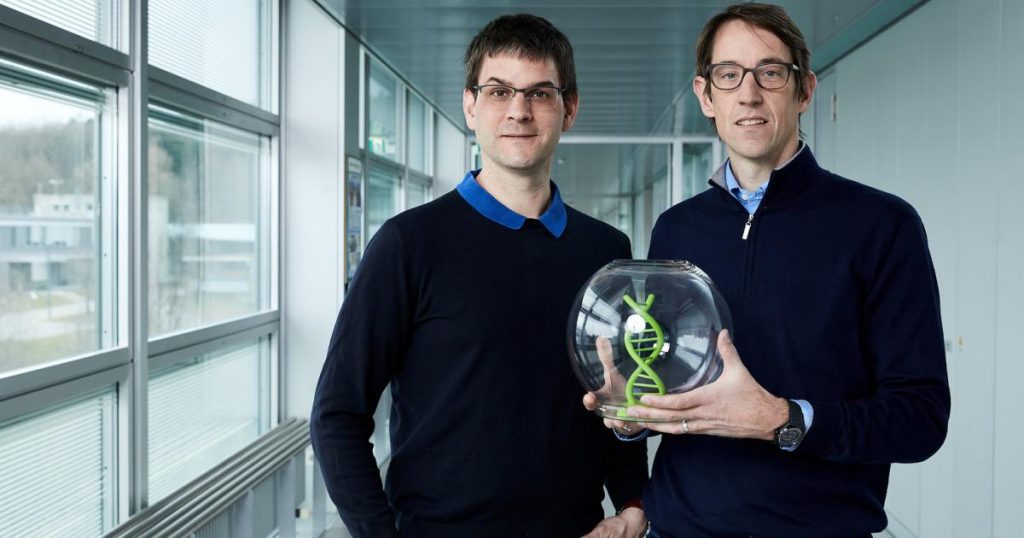Chemist Robert Grass, 41, who comes from Bregenz and works at ETH Zurich, was awarded the European Inventor of the Year 2021 by the European Patent Office (EPA) with his colleague Wendelin Stark on Thursday evening. They received an award in the “Research” category for developing a method for storing data in synthetic DNA, which, sealed in tiny glass spheres, can still be read without errors even after thousands of years.
Long-term data storage redesign
With the Inventor Award, which is awarded in five categories for the fifteenth time this year, the European Patent Office aims to honor outstanding inventors who have made an exceptional contribution to society development, technological progress and economic growth. “The remarkable interdisciplinary research conducted by Grass and Stark has resulted in an invention that has the potential to transform long-term data storage from scratch,” EPO President Antonio Campinos said at the award ceremony online. This innovation is “a real step forward in making the information we produce more durable. It also promises applications in a variety of products.”
Grass and Stark were victorious in their class over the Italian-Danish team of inventors who developed magnetic nanoparticles for diagnosing diseases, as well as against a French team that devised a medical ultrasound method using shear waves. The finalists and winners were selected by an international jury.
Grass and Stark were inspired in their work by nature, which created an advanced storage medium with the genetic material DNA, which contains the building and operating instructions for living organisms. If the data is transformed into a genetic code, which consists of a sequence of four DNA base pairs (adenine, guanine, cytosine, and thymine), large amounts of data can be stored in the smallest spaces. “Theoretically, one gram of DNA can store up to 200 exabytes of data,” Grass said in an interview with the APA on the occasion of his Inventor Award nomination.
Because unprotected DNA strands degrade very quickly under the influence of water, air or heat, the two researchers took the fossils as their model. Because it is protected in bones or teeth, the genetic material of animals or humans can survive a very long time. “We’ve tried to chemically recreate such a fossil,” Grass said.
DNA surrounded by tiny glass beads زجاج
To do this, the two chemists placed synthetic DNA into tiny glass spheres about 100 nanometers in size and up to 10,000 times thinner than a sheet of paper. In this way, the DNA can be protected from corrosion and the effects of temperature. If necessary, the glass is again dissolved with fluoride solution and the information on the DNA strand is read by sequencing. According to tests, DNA can withstand environmental influences for about 2,000 years at average temperatures as in Central Europe.
Over the past few years, Grass and Stark have repeatedly presented to the public how well their technology works. In 2018, they archived British band Massive Attack’s “Mezzanine” album 20 years after it was released as DNA and packaged in glass. Last year they saved the first episode of the Netflix series “Biohackers” as a 100MB video file on DNA.
ETH Zurich has applied for a European patent for Grass and Stark’s invention, which was granted in 2018. The researchers have now established Haelixa through subsidiary ETH in order to commercialize the process. DNA-filled beads can be used in a variety of ways, for example as a powerful barcode to trace products or raw materials. Grass cited the possibility of tracing gemstones or textiles back to their fair trade producers as areas of application.
Robert Grass was born on December 5, 1979 in Bregenz. He studied chemical engineering at the Swiss Federal Institute of Technology (ETH) in Zurich, where he met his doctoral supervisor Wendelin Stark. In 2007 he received his Ph.D. with a thesis on the topic of nanopowder synthesis and its application at ETH. With his expertise, he founded ETH spin-off TurboBeads in the same year, with which he successfully commercialized surface-functional nanomaterials that made new commercial bioanalytical tools possible, thus hemotune AG. In 2016, he co-founded ETH spin-off Haelixa AG, which focuses on a glass-encapsulated DNA storage method. Grass, who holds 13 European patents, has been an assistant professor in the Department of Chemistry and Applied Biological Sciences at ETH Zurich since 2017.

“Food practitioner. Bacon guru. Infuriatingly humble zombie enthusiast. Total student.”








More Stories
Kyiv: Russian Kursk offensive halted
US Presidential Election: Former US Government Officials Warn Against Donald Trump's Election
Netherlands wants to leave asylum system